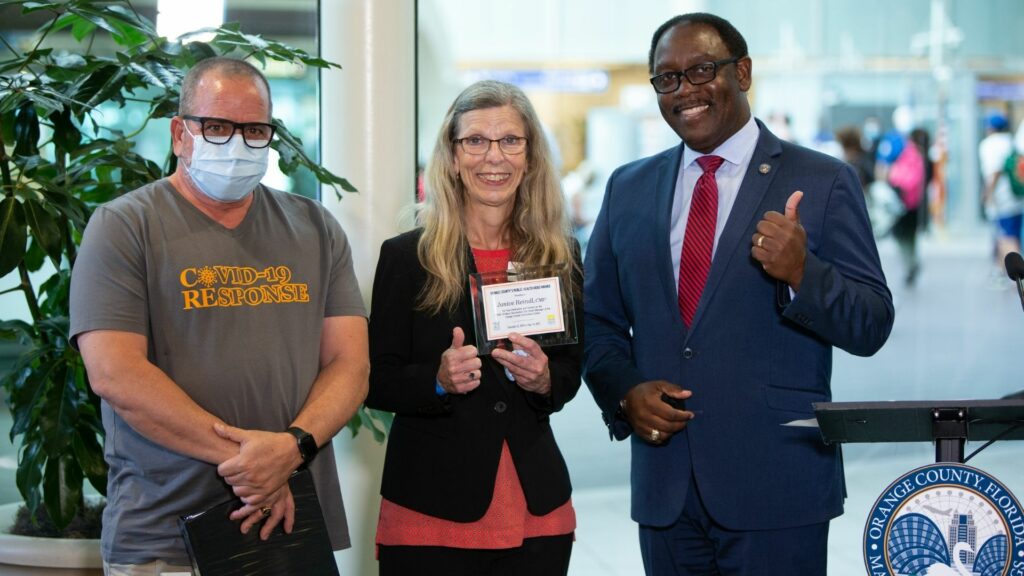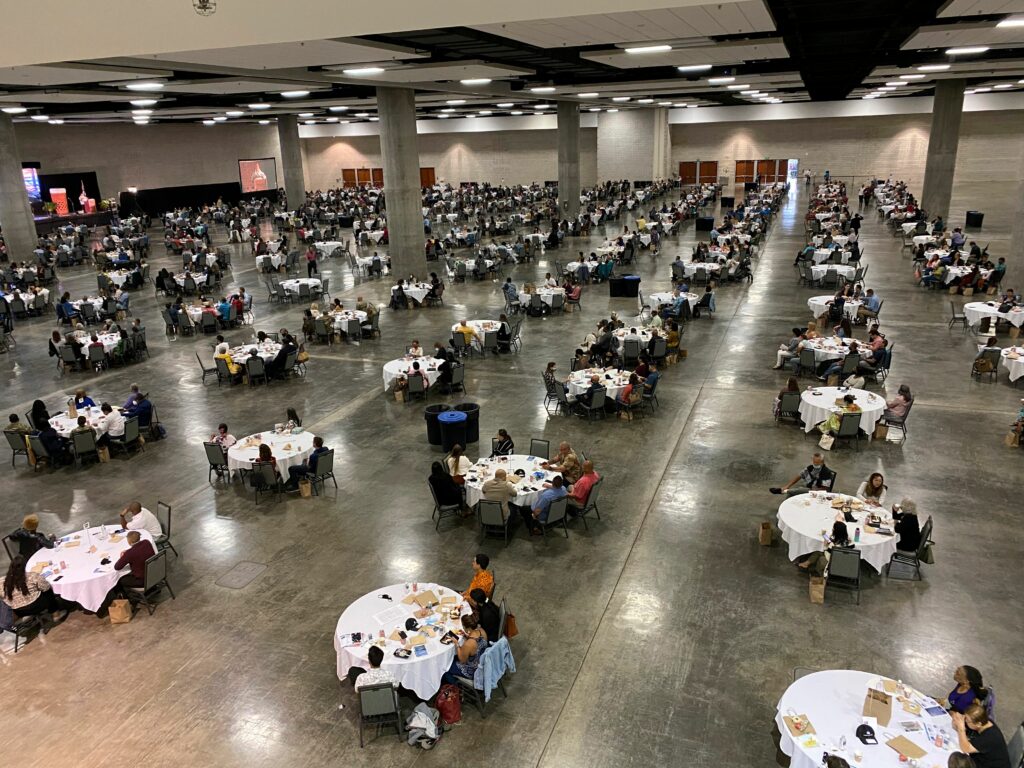Orange County Convention Center Event Manager Janice Reindl Recognized With Public Health Hero Award for Vaccination Site Efforts
By Katarina Dos Santos, MA
Orange County Mayor Jerry L. Demings, along with Florida Department of Health in Orange County Director Dr. Raul Pino, recognized Orange County Convention Center (OCCC) Event Manager Janice Reindl with Orange County’s Public Health Hero Award at the Orlando International Airport.
Reindl has served as the Event Manager for the COVID-19 mass vaccination site at the OCCC for the last five  months.
months.
“She is a shining example of a civil servant, and she truly deserves this honor,” said Mayor Demings during his remarks.
Her unwavering dedication and service to the community has been a pillar in the success of the vaccination site. For five months, six days a week, she has displayed impressive skills in helping to plan and organize the use of the Center’s North Concourse for the first COVID-19 mass vaccination site in Orange County.
Ever-present and ever-vigilant, she became an indispensable daily resource, addressing problems before they disrupted the operation.
Janice also took on the task of feeding the staff and nurses by coordinating with numerous hotels, restaurants, bakeries, and food trucks to feed the more than 200 team members it took to run the vaccination operation each day. This feat alone had a profound, positive impact on the staff’s morale.
A large portion of the credit for the great success of the joint Orange County Government and Florida Department of Health COVID-19 mass vaccination site is due to the dedication, determination and personal drive of Janice Reindl.
Reindl is a resident of Windermere and has been an employee of the OCCC since 2018.
Katarina Dos Santos, MA, is Marketing and Communications Assistant Manager | Marketing & Communications, at the Orange County Convention Center.
Photo: OCCC’s Event Manager Janice Reindl was recently awarded with Orange County’s Public Health Hero Award by Orange County Mayor Jerry L. Demings and Florida Department of Health in Orange County Director Dr. Raul Pino.
Hawai‘i Convention Center Hosts 1,200 Guests for Hawai‘i Prayer Breakfast, Featuring New Safety Protocols and Socially Distanced Meetings Layouts
By Teddi Anderson
The Hawai‘i Convention Center welcomed 1,200 participants for the Hawai‘i Prayer Breakfast on May 7, 2021. It was the Center’s largest in-person meeting since the start of COVID-19 pandemic health and safety
restrictions in March 2020. The breakfast included state and local leaders, as well as noted speakers Dr. Tony Evans and Priscilla Shirer.
The Center has implemented industry-leading health and safety measures led by ASM Global’s comprehensive  Venue Shield program. This includes health and safety technologies, new food and beverage options, revised layouts for socially distanced gatherings, and extensive staff training. During the breakfast, the Center’s Exhibit Hall featured socially distanced tables, as well as freshly made, individually packaged meals, with staff and guests observing PPE guidelines.
Venue Shield program. This includes health and safety technologies, new food and beverage options, revised layouts for socially distanced gatherings, and extensive staff training. During the breakfast, the Center’s Exhibit Hall featured socially distanced tables, as well as freshly made, individually packaged meals, with staff and guests observing PPE guidelines.
The City & County of Honolulu eased COVID-19 restrictions for the island of O‘ahu to allow for select gatherings, meetings and events under the Tier 3 reopening strategy. Tier 3 allows venues such as convention centers, third-party conference room providers, and banquet halls to host low-risk structured events.
Teddi Anderson is President, TLC PR.
San Antonio’s Alamodome Makes Women’s NCAA Basketball Tournament a Slam-Dunk Success
By Region 6 Newsletter
Before the confetti could drop and the 2021 NCAA Women’s Basketball Championship trophy could be raised in San Antonio, one team would have to navigate an unprecedented tournament year and deliver an extraordinary effort amidst the challenges of a global pandemic.
The aforementioned “One Team” consisted of the Alamodome, the City of San Antonio and partners like San
Antonio Sports that helped parlay a championship bid win into an opportunity to host the entire 2021 NCAA Division I Women’s Basketball Championship Tournament with 64 teams competing from March 21 through April 4 in the local region. For its part, the Alamodome expanded a three game championship weekend into a 38 game schedule with an additional 108 practices at the venue. The facility hosted match-ups in the First and Second Rounds and all games of the Sweet Sixteen, Elite Eight and the Finals. Staff made history by creating under one roof, a dual-arena configuration that helped expedite COVID-19 cleaning efforts and enhance social distance protocols. Other fan safety procedures implemented included digital ticketing in socially distanced pods, touch less venue entry, mobile food ordering and the enforced wearing of face covers unless actively eating or drinking.
“Since reopening in the fall of 2020 for the UTSA football season, the Alamodome’s main priority has been fan safety but we also want to help create jobs and paychecks and promote the local economy,” said General Manager Steve Zito, CVE. The NCAA tournament generated an estimated $27.2 million in economic impact for San Antonio and filled 35,000 room nights at area hotels. Tourism was noticeably impacted and images of San Antonio were abundant since all tournament games were broadcasted on either ESPN or ABC networks. An estimated 33,246,000 national broadcast viewers were able to cheer on their teams and experience San Antonio and the Alamodome virtually.
Tim McNeff Hired as Forum’s Vice President of Arena Operations
Venue Operations veteran Tim McNeff has been hired as the Los Angeles Forum’s Vice President of Arena Operations. McNeff comes to the Forum from the Los Angeles Football Club and Banc of California Stadium, where he was the Assistant General Manager and Senior Director, Facilities. He guided the stadium from  construction to its inaugural season as an award-winning sports and entertainment venue and beyond. McNeff has more than 25 years of operations experience and has also worked at Circuit of the Americas, STAPLES Center, and Disneyland Resort.
construction to its inaugural season as an award-winning sports and entertainment venue and beyond. McNeff has more than 25 years of operations experience and has also worked at Circuit of the Americas, STAPLES Center, and Disneyland Resort.
McNeff has both bachelor’s and master’s degrees from California State University, Long Beach. He began his new position on May 17 and reports to Forum General Manager and Senior Vice President of Live Events Geni Lincoln.
Calling All CVEs For Assistance on IAVM Certification Board Project
By Frank Bradshaw, Ph.D., CVE
An increasing number of companies, non-profits, and government organizations want (or may even be required) to engage and employ those who have specific certifications from recognized programs. We want to ensure that the Certification Programs of the IAVM say that its certifications offer proof that those individuals who obtain these certifications have achieved the highest standards of experience, education, and credentialing in the venue management field. We know that certification demonstrates your commitment to superior professionalism, upholding industry standards, and continued learning. These merits can help boost your professional credibility and prestige within the venue management industry as well as your networks.
The IAVM Certification Board wants to ensure that the Certified Venue Executive program continues to  give those who earned the CVE designation recognition of competency, shows a commitment to the venue management profession, and help with job advancement. Toward that end, the Board is conducting an in-depth review of the CVE program, its competency standards, and the certification examination to make sure it reflects the changing dynamics of our industry.
give those who earned the CVE designation recognition of competency, shows a commitment to the venue management profession, and help with job advancement. Toward that end, the Board is conducting an in-depth review of the CVE program, its competency standards, and the certification examination to make sure it reflects the changing dynamics of our industry.
This is where we need the assistance of the current CVEs. You are the subject matter experts. We want you to be a part of this review so that we can continue to hold the CVE as the “mark of excellence” in our industry.
CALLING ALL CVEs!
Your IAVM Certification Board is launching a project to update the knowledge, skills and attributes required of a Certified Venue Executive (CVE).
The Certification Board needs your help to identify, verify, and formalize the range of core competencies that must be demonstrated by venue executives. This project will include research using international occupational classification standards, documented venue management industry norms, and – most importantly in-depth consultation with experienced practitioners (our CVEs) who will serve as Subject Matter Experts (SMEs).
We would like your commitment to complete 6-8 short surveys over a period of approximately 8-12 months. You will receive a survey approximately every 4-6 weeks. Each should take you no more than 5-7 minutes to complete. You will receive 1 certification renewal point for each survey completed … but you must complete every survey in order to qualify for the reward.
More detailed information will be distributed shortly, inviting you to participate in this important project. Please answer the call!
Frank Bradshaw, Ph.D., CVE, is a Retired IAVM Member who serves on the IAVM Certification Board.
Do you want to receive a Front Row News weekly digest?
Categories
- Allied (856)
- Architecture (147)
- Arenas (744)
- Career (890)
- Convention Centers (889)
- Education (608)
- Events (1,528)
- Food & Beverage (193)
- Foundation (113)
- Guest Experience (1,482)
- Industry News (2,253)
- Leadership (1,872)
- Marketing (150)
- Membership (1,985)
- Music (212)
- Performing Arts Centers (453)
- Professional Development (398)
- Research (127)
- Safety & Security (425)
- Sports (763)
- Stadiums (607)
- Student (159)
- Technology (515)
- Ticketing (92)
- Touring (82)
- Trends (357)
- Uncategorized (771)
- Universities (216)
- Video (25)
- Young Professional (198)
Twitter Feed
- Twitter feed loading
Recent Posts
- GEODIS Park Selects Allied Universal As Its Preferred Event Services Provider
- Venuworks Appoints Marc Solis as Executive Director of the Fresno Convention and Entertainment Center
- Los Angeles Convention Center Diverts 8,000 Pounds of Wood Waste to Local Foundation Supporting Fire Victims
- Fort Worth Unveils Plans for Phase 2 of Convention Center Transformation
- San Diego Convention Center CEO Announces Retirement After a Decade of Leadership
Categories
- Allied
- Architecture
- Arenas
- Career
- Convention Centers
- Education
- Events
- Food & Beverage
- Foundation
- Guest Experience
- Industry News
- Leadership
- Marketing
- Membership
- Music
- Performing Arts Centers
- Professional Development
- Research
- Safety & Security
- Sports
- Stadiums
- Student
- Technology
- Ticketing
- Touring
- Trends
- Uncategorized
- Universities
- Video
- Young Professional
Archives
- February 2026
- January 2026
- December 2025
- November 2025
- October 2025
- September 2025
- August 2025
- July 2025
- June 2025
- May 2025
- April 2025
- March 2025
- February 2025
- January 2025
- December 2024
- November 2024
- October 2024
- September 2024
- August 2024
- July 2024
- June 2024
- May 2024
- April 2024
- March 2024
- February 2024
- January 2024
- December 2023
- November 2023
- October 2023
- September 2023
- August 2023
- July 2023
- June 2023
- May 2023
- April 2023
- March 2023
- February 2023
- January 2023
- December 2022
- November 2022
- October 2022
- September 2022
- August 2022
- July 2022
- June 2022
- May 2022
- April 2022
- March 2022
- February 2022
- January 2022
- December 2021
- November 2021
- October 2021
- September 2021
- August 2021
- July 2021
- June 2021
- May 2021
- April 2021
- March 2021
- February 2021
- January 2021
- December 2020
- November 2020
- October 2020
- September 2020
- August 2020
- July 2020
- June 2020
- May 2020
- April 2020
- March 2020
- February 2020
- January 2020
- December 2019
- November 2019
- October 2019
- September 2019
- August 2019
- July 2019
- June 2019
- May 2019
- April 2019
- March 2019
- February 2019
- January 2019
- December 2018
- November 2018
- October 2018
- September 2018
- August 2018
- July 2018
- June 2018
- May 2018
- April 2018
- March 2018
- February 2018
- January 2018
- December 2017
- November 2017
- October 2017
- September 2017
- August 2017
- July 2017
- June 2017
- May 2017
- April 2017
- March 2017
- February 2017
- January 2017
- December 2016
- November 2016
- October 2016
- September 2016
- August 2016
- July 2016
- June 2016
- May 2016
- April 2016
- March 2016
- February 2016
- January 2016
- December 2015
- November 2015
- October 2015
- September 2015
- August 2015
- July 2015
- June 2015
- May 2015
- April 2015
- March 2015
- February 2015
- January 2015
- December 2014
- November 2014
- October 2014
- September 2014
- August 2014
- July 2014
- June 2014
- May 2014
- April 2014
- March 2014
- February 2014
- January 2014
- December 2013
- November 2013
- October 2013
- September 2013
- August 2013
- July 2013
- June 2013
- May 2013
- April 2013
- March 2013
- February 2013
- January 2013
- May 2012
- March 2012
- December 2011
- November 2011
- October 2011
Recent Comments
- Frank Bradshaw, Ph.D., CVE on John Meyer, CVE, a Tireless Advocate of Certification for Venue Professionals, Has Died
- Neil Sulkes on Hilary Hartung, Friend to Many in Venue Marketing, Has Left Us
- Jason Parker, CVE on The Devastation of Hurricane Helene and How We Can Support One Another
- Larry Perkins on Touhey Testifies Against Speculative Ticketing Before Congressional Subcommittee
- Peter Secord on Major Players for Planned Elkhart Amphitheater Were in the Mix at VenueConnect
